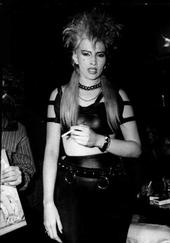Alexandra Sladjana Milosevic Hagadone was born in Belgrade, Serbia. Her talent for music became very apparent at the early age, so she started education in classical music at the age of five, playing piano. Few years later, her interest turned to studying violin. At the age of twelve she became a singer and a bass-guitarist in a rock and roll school band, though she had not given up violin playing. She recorded a first single at the age of fifteen, playing violin and singing Indian influenced music with a group “Ganeshaâ€. From then on, her interests had shifted towards various artistic expressions such as acting, playing music and dancing in the fringe theatres and experimental movies. She acted in Belgrade’s “Ex Art†Theatre, “Atelje 212†Theatre and in “Academic Kino Club Krsmanovicâ€. As a violinist, a member of "Belgrade Radio - Television Orchestra", her career continued doing studio work. Nevertheless, playing in a big orchestra appeared to be an obstacle for a further creative development, so she decided to proceed as a soloist. As a singer, she had won her first prize at “Maglaj Youth Festival†in 1974. In 1976, she toured the former Soviet Union as a soloist in “Sasha Subota Orchestraâ€, where she had recorded a “Compilation of World Hits†LP and a single "Mikado" for Soviet label “Melodiaâ€. Besides extensive touring with hundreds of concerts performed throughout former Soviet Union, she took part in numerous TV shows. One of the highlights was her interpretation of Marina Cvetaieva’s poem “I Like When You Are Yearning for Meâ€, sung in Russian on Moscow TV, in a special birthday greeting for Soviet Union’s President Leonid Brezniew. Being in constant discordance with restrictive regime and the media, despite all the efforts, she could not release a solo record in her homeland Yugoslavia for many years. Thus, she invests her funds and finally manages to produce and release the first single in 1977. Unexpectedly, it had achieved an immediate success hitting no. one on the charts. Alexandra S. Milosevic's provocative first song “Au, Au†caused controversial reactions. However, her creative potential, persistence and consistence of ideas had won over. She stimulated and influenced younger musicians and other less courageous, to follow her path.From then on, every song she had released hit the top of the charts: “Au, Auâ€(1977), “Sympathyâ€(1978), “Sexy Lady†(1978), then “Amsterdamâ€, and “Obviously I'm not Indifferentâ€, off of an “Anxious to Waste the Night Away†LP (1979). Alexandra’s fame spread throughout the entire region and the surrounding countries. At midnight, Hungarian audience celebrated with Alexandra an arrival of the New Year 1979, through her one hour performance on National TV, Budapest. Alexandra represented TV Belgrade on a “Eurovision Song Contest†in 1981, with a song “Recipe for Loveâ€. In 1982, as a Special guest, she embarked with her band on a national Yugoslav tour with English rockabilly legends the “Matchboxâ€. In 1983. she started a band “Neutral Design†in Munich, Germany and released a self - titled album. Musicians who took part in this project collaborated with stars and bands known worldwide such as: “Santanaâ€, “Nina Hagen Bandâ€, “Splif†etc. Songs off of this LP were broadcasted and sold in West Germany, Sweden, Yugoslavia and other European countries. A single “Das Licht von Kairo / Miki, Miki†released in Yugoslavia, became a mega hit. At “Opatia Festival 1984.†Alexandra S. Milosevic won a “Special Award for Interpretation†for the composition “Samsaraâ€. Another great success followed, with Maxi-single “Princessâ€, a duet with Dado Topic, which premiered at the “Eurovision Song Contest†in 1984. In the summer of that year, Alexandra filmed a 24 minutes animated show “The Girl in a World of Chipsâ€, for Bosnian TV, Sarajevo. The show was awarded a Plaquette at the international “Montreux TV Festivalâ€. It also took “The Best Yugoslav TV Show of the Year†award on national “Struga TV Competitionâ€. For more click blog page - "Biography"
..
..
